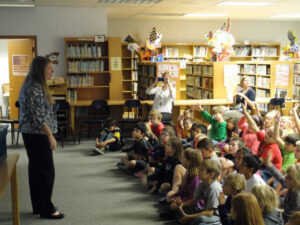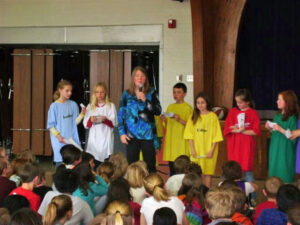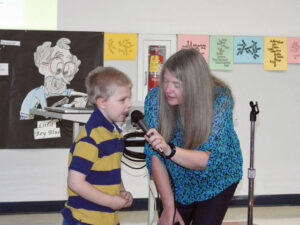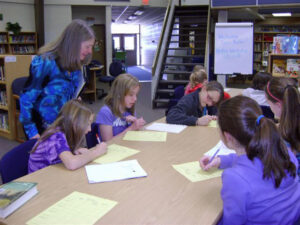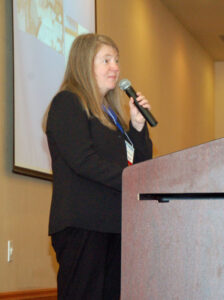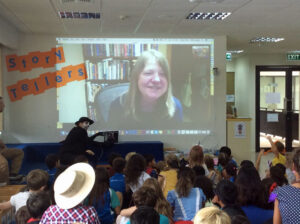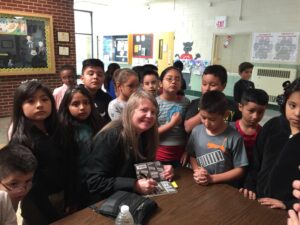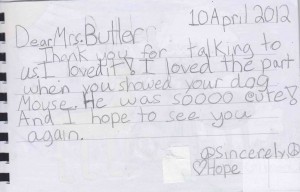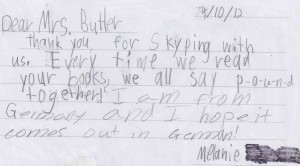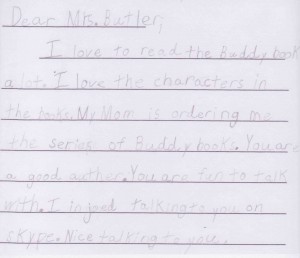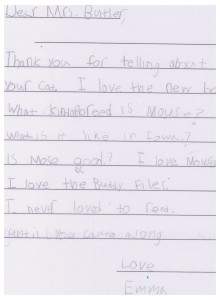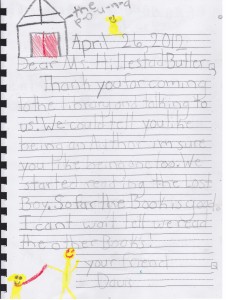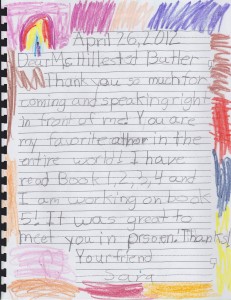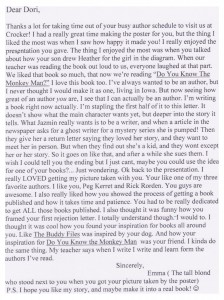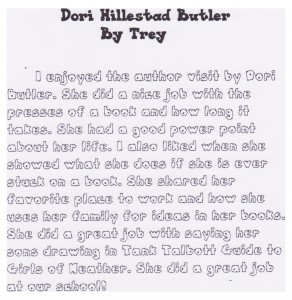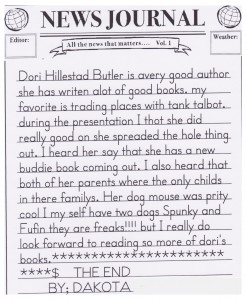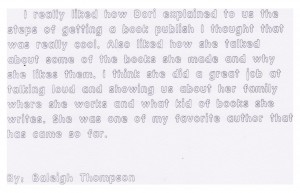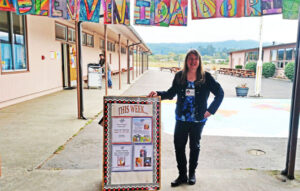 I love to visit schools and libraries all over the country. In fact, it's my dream to do an author visit in all 50 states. You can read all about that HERE. I am comfortable with all grade levels and any size group, but I prefer to speak to just one or two grade levels at a time. What I have to say to a second grader is different from what I have to say to a fifth grader.
I love to visit schools and libraries all over the country. In fact, it's my dream to do an author visit in all 50 states. You can read all about that HERE. I am comfortable with all grade levels and any size group, but I prefer to speak to just one or two grade levels at a time. What I have to say to a second grader is different from what I have to say to a fifth grader.
I usually do three sessions per day. Those sessions can include any combination of large group presentations, small group presentations and/or writing workshops. If you need a fourth session, that can be arranged for an additional fee. If you'd like to share my visit and expenses with a nearby school, I am happy to do two sessions at one school and two sessions at another on the same day.
Please allow at least 15 minutes between sessions, time for lunch, and, if necessary, time to travel to the second school.
Large Group Presentations
I talk about what an author is, what an author does, how being an author is different from being an illustrator, the difference between fiction and nonfiction. My presentation is very interactive and I stress that the students are all authors just like I am.
45 minutes. Any size group.
I talk about how I became an author, the stories behind some of my books, where I find ideas, and my writing/revision process. I also talk about therapy dogs and point of view. I give students the tools to write their own fiction stories and I stress the importance of having a goal (whether that goal be writing or something else) and working toward it.
45 minutes. Any size group.
I talk about how I became an author, the stories behind some of my books, where I find ideas, and my writing/revision process. This presentation goes into more detail on my writing process than the grades 2-4 presentation. I give students the tools to write their own fiction stories and I stress the importance of having a goal (whether that goal be writing or something else) and working toward it.
Choose 45-minute presentation or 60-minute presentation. (The 60-minute presentation includes an interactive demonstration of how a book gets published. I will need space at the front of the room for 14 students to be up there with me. I will also need a table to hold props for this demonstration.)
I talk about what it’s like to be a writer, where I find ideas, the writing/revising process, careers for writers, and how to get published.
45 minutes. Any size group.
Writing Workshops
Begins with a brief discussion of emotion, why it’s such an important element of fiction writing, and tools authors use to convey emotion in their work. Then students will write a short piece demonstrating what they’ve learned.45 minutes. 4th-6th grade. 30 students or less
Which is most important in a fiction story? The character or the plot? Which comes first in the development of a good fiction story? I’ll show students how these two elements come together and how characters affect plot and plot affects character. Students use a worksheet to pre-plan their story, then write a short piece demonstrating what they’ve learned.
45 minutes. Can be adapted to any level 4th grade to adult. 30 students or less.
No story comes out perfect the very first time. Every author must revise. It’s simply part of the process. I think it’s the best part of the process. But sometimes it’s hard to know what needs to be done. Revision is about more than simply changing a few lines here and there. The word revision means “to see again.” Through discussion and an in-depth handout, I’ll help your students see their work through fresh eyes as they discover new ways to look at their characters, their plot, their beginnings/middles/ends, their sensory details and all their other story elements.
45 minutes. Can be adapted to any level 4th grade to adult. 30 students or less
I also offer full week workshops that focus on a different element each day; ideas, character, plot, peer critiquing and revision.
45 minutes/session. Can be adapted to any level 4th grade to adult. 30 students or less.
Presentations for Adults
Dori talks about how she became an author, the stories behind a couple of her books, her writing/revision process, what it was like to win the Edgar award, what it was like to face a public challenge to one of her books. (60 minutes. High School/College/Adult. Any size group. Appropriate for SCBWI and other writer’s conferences, colleges and universities, and library groups.)
Begins with an overview of the history of the children’s mystery genre and how mysteries vary for different age groups, then moves into the elements of mystery fiction and how mystery authors craft their stories. Also includes discussion of how much is too much violence in a children’s mystery and censorship. (60 minutes. Adult. Any size group. Appropriate for SCBWI and other writer’s conferences, colleges and universities, and library groups.)
Begins with an overview of the history of kids’ series books, why series appeal to kids, then moves into a nuts and bolts discussion on how to create a successful children’s series. (60 minutes. Adult. Any size group. Appropriate for SCBWI and other writer’s conferences, colleges and universities, and library groups.)
Most book challenges are done quietly. Often the author doesn’t even know her book has been challenged. But sometimes the author does know. And sometimes the challenge becomes very public. Dori appeared on Fox TV’s Fox and Friends with a babysitter who challenged her My Mom’s Having a Baby. This book continues to face challenges all over the country and has risen as high as #4 on ALA’s list of most challenged books. Dori discusses her experience and offers suggestions for how to deal with the fact that not everybody likes your book, what you can do if your book is ever challenged, how to work with your publisher to support the library or school where your book was challenged, what your responsibilities are as an author, how to deal with nasty e-mails and unwanted media attention, and how to be professional and approach the situation with grace. (60 minutes. Adult. Any size group. Appropriate for SCBWI and other writer’s conferences, colleges and universities, and library groups.)
Virtual Visits
I am happy to talk to your group via your platform of choice.
I don't do any sort of formal presentation. I ask that everyone in the group have read or heard at least one of my books first and come prepared with questions.
I do 15-minute "Meet & Greet" Q&A sessions for FREE. If you need more than one session or more than 15 minutes, I ask for a small fee.
E-mail me for details. Important: Please tell me what time zone you’re in! I’m in the Pacific Time Zone
 Why Have An Author Visit?
Why Have An Author Visit?
Author Visits Benefit students, the library, the school, and the community. Here's how:
- They create visibility for the school
- They provide an opportunity for community PR and partnerships between the school and the community
- They initiate personal connections between students and book creators
- They motivate students to read and write
- They create a surge in library usage
- They motivate students to have a goal or dream and not give up when things get hard
- They contribute to improvements in reading scores
- They improve school morale
Here's a LINK to an article on the value of an author visit.
And here's a LINK to more information on making an author visit successful.
Think you can't afford an author visit?
 Here's a 5th grader who really wanted me to come to her school:
Here's a 5th grader who really wanted me to come to her school:
Believe it or not, she raised the money for my visit on her own!
Read about why she wanted me to come, how she raised the money, and what she thought about the visit HERE.
Here are some other ideas for funding author visits:
–Host a fundraiser at your school
—Go to your local PTA/PTO
–Go to your local Friends of the Library
–Go to other Go to local civic organizations such as Rotary, Lions, Kiwanis etc.
–Apply for a grant. Here are some:
- Adopt a Classroom
- American Association of School Librarians Innovative Reading Grant
- Barnes & Noble Sponsorship and Charitable Donations
- Donors Choice
- Maureen Hayes Award
- National Endowment for the Humanities
Steps to Beginning the Funding Process:
1. Figure out the cost (author's honorarium, transportation, lodging, food, books)
2. Assign a teacher, librarian or parent to be in charge of writing the funding request. To see a sample funding request letter, click HERE
3. Have that person write the letter on school letterhead describing:
- -A need (What educational objective are you hoping to address?)
- -How will the school fill that need (i.e. author/illustrator visit)
- -The specific request (Money, but perhaps also volunteer time? Promotion?)
- -What the school will contribute as a partner (Shared expense? Promote the organization?)
- -The expected outcome (Include how many students will be served by this program and in what way they will benefit? Describe expected short-term and long-term gains?)
What Teachers and Librarians Say After My Visit
"Our students were flabbergasted at the amount of time it takes for an author's final copy to get into the hands of the readers. Dori's presentation really opened the eyes of the readers and writers in our school, and made me appreciate the true love of writing that most authors possess." -Mrs. Steinhart (Washington, IA)
"Our students still talk about your visit, and your books are never on our shelves." -Mrs. Kunde (Coralville, IA)
"One of the highlights of our Summer Reading Program was having Dori Butler lead a book discussion for 6th – 8th graders about one of her books; The Truth About Truman School. Not only did the students get to know Dori, and learn how she’s turned her passion into an amazing writing career, they also had an awesome discussion about bullying and what goes on in their schools. I was amazed at how comfortable the kids were talking to her about very personal issues and how insightful Dori’s comments were. An invaluable experience for all involved!" – Karen Stierler (Coralville Public Library)
"Dori Butler's enlightening keynote address earned a standing ovation from a room full of Youth Librarians. The passion Dori has for her young readers is impressive. Children, Tweens, and Teens need to discover this author's award-winning books if they haven't already. –Debbie Wagenbach, Youth Services Librarian
